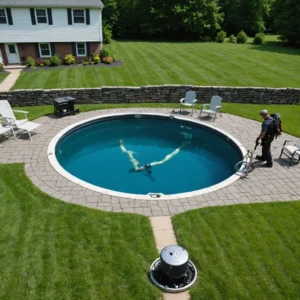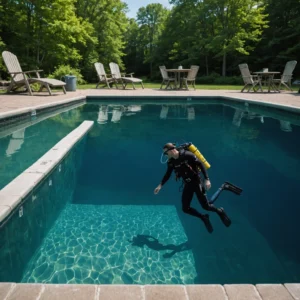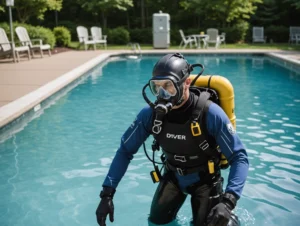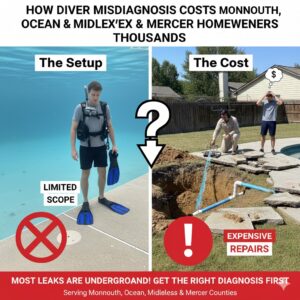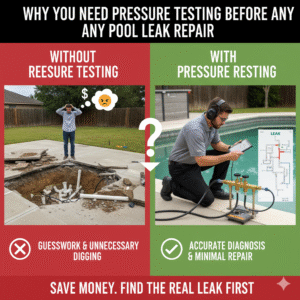In towns across Mercer County, from Princeton and Hamilton to Lawrenceville, Ewing, Pennington, and Robbinsville, homeowners often experience the same frustrating cycle: a diver inspects the pool, claims to have found and fixed the leak, but the water level continues to drop. This is not an unusual situation — it is one of the most common patterns in the pool industry. Diver-only inspections may feel thorough, but they are fundamentally incomplete. While divers focus exclusively on what they can see from inside the pool, more than half of all leaks in Mercer County originate underground, behind pool walls, or inside plumbing lines that divers cannot access. As a result, homeowners often receive incorrect diagnoses and unnecessary repair recommendations that fail to solve the real problem.
Mercer County has a diverse mix of older pools and newly constructed systems, each presenting unique challenges. Many homes built before the early 2000s have plumbing lines that have aged significantly. PVC becomes brittle over time, fittings loosen, and the freeze-thaw cycle can create stress fractures several feet underground. These leaks cannot be seen by a diver. Yet divers often diagnose interior issues simply because that is the only area they can inspect. When a diver claims that a liner tear, step crack, or skimmer imperfection is causing water loss, they are basing that conclusion on visual observation alone — not on measurable testing.
The proper approach to leak detection begins with isolating and pressure testing every plumbing line. A professional technician seals each suction line, return line, skimmer line, and main drain line individually, then applies air pressure through precision gauges. If a line loses pressure, it means there is a leak somewhere underground. This kind of testing provides definitive proof — something diver-only inspections cannot offer. Once a leaking line is identified, professional leak detection equipment such as sonic listening devices, tracer gases, and electronic pipe locators are used to determine the exact location of the leak beneath soil, grass, patios, or concrete.
Without this type of instrumentation, divers are essentially guessing. Many Mercer County homeowners call leak detection specialists only after a diver’s “repair” fails within days. A diver might patch a small imperfection on a liner or apply putty to a fitting, but if the leak is actually in a return line under the deck or a suction line beneath the yard, the water will continue to escape. Unfortunately, divers may come back again and again, each time performing additional guess-based repairs that offer temporary reassurance but no real solution.
Mercer County also has many pools with structural complexities that divers are not trained to diagnose. Skimmer leaks, for example, frequently develop behind the skimmer housing where the plumbing meets the structure. These leaks cannot be seen underwater. A diver may see a hairline cosmetic mark inside the skimmer throat and claim it is “the leak,” when in reality the true failure point is several inches behind the wall. The same applies to return lines: what looks intact from inside the pool may hide a crack deeper in the pipe. These hidden failure points require pressure testing and listening equipment — not goggles and guesswork.
Another issue that divers overlook is the effect of soil conditions in Mercer County. Areas like Princeton, Pennington, and Hopewell have soil that expands and contracts during seasonal weather changes. These movements place stress on underground plumbing, causing small cracks or separations. Divers have no way to identify these issues because they occur far outside the diver’s field of view. Homeowners who rely solely on a diver’s assessment often spend weeks refilling their pool, dealing with chemical imbalances, and losing more water than they realize.
The cost of misdiagnosis in Mercer County can be substantial. Water bills increase from constant refilling, lawns become saturated, patios shift due to underground erosion, and homeowners end up paying for repairs that never fix the real leak. Some homeowners are even told that their entire liner needs replacement when the real problem is a cracked return line beneath the deck — a repair costing a fraction of a liner replacement. Diver-only inspections create a chain reaction of wasted money, repeated service calls, and homeowner frustration.
Real leak detection companies take a completely different approach. They do not rely on what they can see underwater. Instead, they evaluate the entire pool system using measurable, scientific testing. This includes pressure testing, static testing, dye testing, electronic pipe locating, and acoustic listening. By analyzing each line and structural component individually, professionals can identify the precise failure point and recommend the correct repair. This prevents unnecessary digging, avoids expensive mistaken repairs, and helps homeowners understand the true cause of their water loss.
Mercer County residents deserve accurate diagnostics, clear answers, and long-term solutions — not underwater guesses. With the right tools and testing process, professional leak detection companies can find leaks that divers overlook completely. By avoiding diver-only services and choosing a company equipped with real leak detection technology, homeowners protect their pools, reduce unnecessary expenses, and ensure the job is done correctly the first time. When it comes to leak detection, the difference between a diver and a true technician is enormous, and choosing the right approach will save time, money, and stress for years to come.

